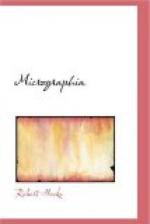That being so exceeding fluid a body, it easily gives passage to all other bodies to move to and fro in it.
That it neither receives from any of its parts, or from other bodies; nor communicates to any of its parts, or to any other body, any impulse, or motion in a direct line, that is not of a determinate quickness. And that when the motion is of such determinate swiftness, it both receives, and communicates, or propagates an impulse or motion to any imaginable distance in streight lines, with an unimaginable celerity and vigour.
That all kind of solid bodies consist of pretty massie particles in respect of the particles of this fluid medium, which in many places do so touch each other, that none of this fluid medium interposes much after the same mannner (to use a gross similitude) as a heap of great stones compose one great congeries or mass in the midst of the water.
That all fluid bodies which we may call tangible, are nothing but some more subtile parts of those particles, that serve to constitute all tangible bodies.
That the water, and such other fluid bodies, are nothing but a congeries of particles agitated or made fluid by it in the same manner as the particles of Salt are agitated or made fluid by a parcel of water, in which they are dissolv’d, and subsiding to the bottom of it, constitute a fluid body, much more massie and dense, and less fluid then the pure water it self.
That the air on the other side is a certain company of particles of quite another kind, that is, such as are very much smaller, and more easiely moveable by the motion of this fluid medium; much like those very subtile parts of Cochenel, other very deep tinging bodies, where by a very small parcel of matter is able to tinge and diffuse it self over a very great quantity of the fluid dissolvent; or somewhat after that manner, as smoak, and such like minute bodies, or steams, are observ’d to tinge a very great quantity of air; onely this last similitude is deficient in one propriety, and that is a perpetuity or continuance in that state of commixture with the air, but the former does more neerly approach to the nature and manner of the air’s being dissolv’d by this fluid or AEther. And this Similitude will further hold in these proprieties; that as those tinctures may be increased by certain bodies, so may they be precipitated by others, as I shall afterwards shew it to be very probable, that the like accidents happen even to the Air it self.
Further, as these solutions and tinctures do alter the nature of these fluid bodies, as to their aptness to propagate a motion or impulse through them, even so does the particles of the Air, Water, and other fluid bodies, and of Glass, Crystal, &c. which are commixt with this bulk of the AEther alter the motion of the propagated pulse of light; that is, where these more bulkie particles are more plentifull, and consequently a lesser quantity of the AEther between them to be mov’d, there the motion must necessarily be the swifter, though not so robust, which will produce those effects, which I have (I hope) with some probability, ascribed to it in the digression about Colours, at the end of the Observations on Muscovy-glass.




